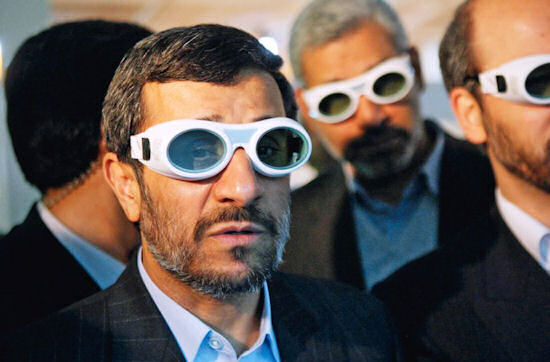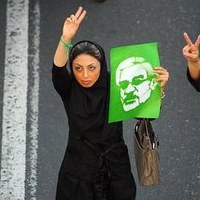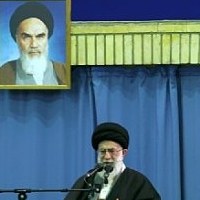![]()
Thu, Aug 18, 2011 | Rubin Reports | By Barry Rubin

Iranian President Mahmoud Ahmadinejad wears eye protection goggles as he visits an exhibition of Iran's laser science in Tehran, Iran, in February. The international community has long suspected that Iran is secretly pursuing a nuclear weapons program. (AP)
Do Iraqi Documents Give Some Hints About the Iranian Regime’s Nuclear Strategy?
Using captured Iraqi documents, Hal Brands and David Palkki, have published an interesting short paper for the Foreign Policy Research Institute (FPRI), “Why did Saddam Want the Bomb? The Israel Factor and the Iraqi Nuclear Program.”
They begin:
“On March 27, 1979, Saddam Hussein…laid out his vision for a long, grinding war against Israel in a private meeting of high-level Baathist officials. Iraq, he explained, would seek to obtain a nuclear weapon from ‘our Soviet friends,’ use the resulting deterrent power to counteract Israeli threats of nuclear retaliation, and thereby enable a “patient war” — a war of attrition — that would reclaim Arab lands lost in the Six Day War of 1967. As Saddam put it, nuclear weapons would allow Iraq to “guarantee the long war that is destructive to our enemy, and take at our leisure each meter of land and drown the enemy with rivers of blood.”
While an analogy doesn’t prove the point, I think that contemporary Iranian thinking is equivalent: get nuclear weapons and use them for what I call a defensive umbrella for aggression. By possessing nuclear weapons, Tehran would ensure that nobody would challenge it seriously so that it could continue sponsoring revolution and terrorism with little fear of retaliation from either Israel or the United States.
Of course, accidents can happen, an ideological obsession could lead to using nuclear weapons even if that led to a devastating war of destruction on Iran, or parts of the government possessing particular revolutionary zeal could give such weapons to terrorist groups. But the basic idea — which could easily go astray — seems parallel to that of the Iraqi dictator.
It is important to remember that the desire to have nuclear weapons for defensive purposes is not inconsistent with an aggressive policy. After all, why else would anyone want to attack Iran? And having nuclear weapons makes it much easier for the government in Tehran to spread both Islamist revolution and Iran’s own influence, two factors that are also not contradictory.



 RSS
RSS










njslea Do Iraqi Documents Give Some Hints About the Iranian Regime's Nuclear: “On March 27, 1979… http://t.co/XoLr1lk thejerichomarch